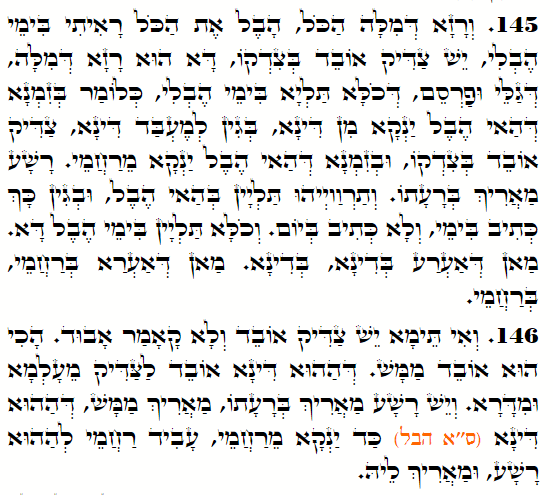Daily Zohar # 4162 – Bo – Days of vanity
Daily Zohar 4162

Hebrew translation:
146. וְאִם תֹּאמַר, יֵשׁ צַדִּיק אֹבֵד, וְלֹא אָמַר אָבוּד – כָּךְ הוּא אוֹבֵד מַמָּשׁ, שֶׁאוֹתוֹ הַדִּין אוֹבֵד לַצַּדִּיק מֵהָעוֹלָם וּמֵהַדּוֹר. וְיֵשׁ רָשָׁע מַאֲרִיךְ בְּרָעָתוֹ – מַאֲרִיךְ מַמָּשׁ. שֶׁכְּשֶׁאוֹתוֹ הַדִּין (הֶבֶל) יוֹנֵק מֵרַחֲמִים, עוֹשֶׂה רַחֲמִים לְאוֹתוֹ רָשָׁע וּמַאֲרִיךְ לוֹ.
.
Zohar Bo
Continued from previous DZ
#145
Ecclesiastes 7:15
“אֶת הַכֹּל רָאִיתִי בִּימֵי הֶבְלִי יֵשׁ צַדִּיק אֹבֵד בְּצִדְקוֹ וְיֵשׁ רָשָׁע מַאֲרִיךְ בְּרָעָתוֹ.”
“I have seen everything in my days of vanity: There is a just man who perishes in his righteousness, And there is a wicked man who prolongs life in his wickedness.”
The secret of “all is vanity” is in “days of vanity,” which relates to the time the vapor draws from the Left to inflict the judgment of “a Tzadik who perishes in his righteousness.” It happens before the Left joins the center column. When the vapor draws from the side of Mercy, “a wicked man prolongs life in his wickedness.” Both the wicked and the righteous are connected to this ‘vapor,’ which is why it is written “days of vanity” in a plural form.
#146
He asks, it is written, “There is a Tzadik who perishes…” in a present continuous tense, and it doesn’t say perished. If it depends on the time, he would have to say it past tense and not the present tense.
He replies that every time judgment arises, the Tzadik perishes from the world and the generation, which is a continuous state.
When judgment draws from the side of Mercy, the evil person actually prolongs his sins because mercy prolongs the time of the wicked person.
{||}

 Previous: Bo
Previous: Bo

